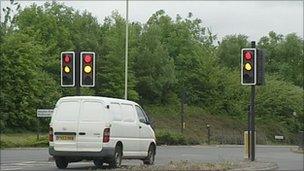Swindon traffic lights to slow speeding drivers
- Published

There will be no warning of where the speed sensors are
Speeding drivers in Swindon are to be slowed down by using traffic lights.
The town is thought to be the first in the UK to use the system in which cars going over the speed limit will trigger the lights up ahead.
The scheme will initially be piloted on Thamesdown Drive - where 67% of vehicles exceed the limit - and Queen's Drive - where 38% of vehicles speed.
Fixed speed cameras were abandoned by the Conservative-led borough council in 2009.
Gwillam Lloyd, the council's head of highways, said: "What we are going to do is install sensors in the road. Those sensors will monitor the speed of vehicles.
"If a vehicle is speeding then the lights will turn red."
He said drivers would be given no warning of where the sensors were located.
'Monitor driver behaviour'
Councillor Peter Greenhalgh, cabinet member for transport, said: "We've seen it working elsewhere in Europe and what it does is it destabilises the driver.
"Frequently you see drivers just concentrating on themselves rather than what's happening in front of them. What this does is it takes those drivers out of that comfort zone and makes them concentrate on what's actually happening ahead."
There will be no signs to tell the driver why the lights have turned red.
Councillor Greenhalgh said: "The whole key is to monitor driver behaviour without beating them over the head.
"It may annoy them, but I think eventually people will work out that if they maintain a constant speed at or around the speed limit then actually their journey times will be much shorter because they won't be getting delayed by traffic lights."
The safety partnership in charge of speed cameras in Swindon closed in October last year.
Swindon's council, a member of the partnership, was the first local authority in England to abandon fixed speed cameras the year before.
Professor Stephen Glaister, director of the RAC Foundation, said: "We welcome trials of technologies other than cameras to deter speeding drivers and this sort of system is already extensively used in Spain and Portugal.
"But will the odd red light be enough of a deterrent to change the behaviour of persistent offenders? Some law-abiding motorists will surely be irritated at being stuck at the signals behind an errant driver, effectively paying the price for someone else's law breaking.
"But if speeding can be made as socially unacceptable as drink-driving without the need for a big stick then the majority of drivers should welcome the move."
- Published1 November 2010
- Published20 August 2010